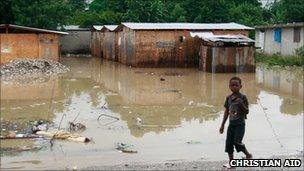Haiti cholera death toll reaches 544
- Published

Health officials and aid organisations fear that the flooding might lead to a rise in cholera infections
The death toll from an outbreak of cholera in Haiti has reached 544, the health ministry says.
About 8,000 cholera patients are also in hospitals, with growing concerns that the disease has spread to the capital Port-au-Prince.
An aid organisation told the BBC that it was treating at least 30 suspected cholera cases in the city.
The death toll from Hurricane Tomas has reached 20, with 36 injured and 11 missing, officials said.
The number of those killed by the cholera epidemic on Monday rose to 544 from 501 on Sunday and 442 on Wednesday.
Authorities fear that the outbreak could worsen after Hurricane Tomas brought heavy rains last week.
Local authorities and relief agencies have been attempting to get clean drinking water to those areas worst- affected by the storm, which triggered flooding and mudslides.
There was flooding in Leogane, Les Cayes, Jacmel and Gonaives, while many mountain towns have been cut off by flooded roads and landslides.
Susan Barry, from the charity Christian Aid, says people in the Leogane area are using brooms and shovels to remove the worst of the thick mud.
However, Ms Barry says the main concern is that the flooding could result in the spreading of cholera, with people forced to drink contaminated water and lacking access to basic sanitation.
The Artibonite River, believed to be a source of the outbreak of the epidemic in October, flooded over the weekend. People living along the river were asked to evacuate the area.
Capital worries
The hurricane passed without destroying the tented camps in and around Port-au-Prince, which house about 1.3 million survivors of January's earthquake.
But there fears over the increased risk of cholera in the capital.
Haitian officials have not confirmed the presence of the disease in the city, but there has been concern that it is spreading.
Health officials were examining at least 120 suspected cases of cholera in Port-au-Price on Monday, the executive director of the Haitian health ministry, Gabriel Timothee, told the AP agency.
The BBC's Laura Trevelyan says a leading specialist medical agency has told her that it is treating at least 30 suspected cases in the capital.
When visiting the city's biggest slum Cite Soleil, our correspondent was told by two patients suffering from severe vomiting and diarrhoea that people had died from cholera in their neighbourhoods.
If confirmed, the epidemic could threaten an estimated 2.5 to 3 million people in Port-au-Prince.
Cholera itself causes diarrhoea and vomiting, leading to severe dehydration. It can kill quickly but is treated easily through rehydration and antibiotics.
On Friday, Haiti's government and the United Nations appealed to donors for nearly $19m (£11.7m) to cover urgent humanitarian needs.
- Published7 November 2010
- Published6 November 2010
- Published5 November 2010
- Published4 November 2010